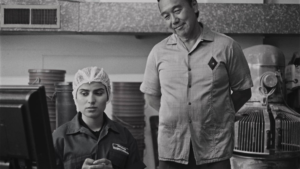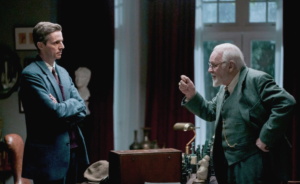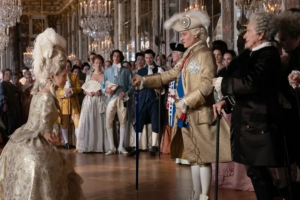Reviewed by GREG KING
Director: Rachel Griffiths
Stars: Theresa Palmer, Sam Neill, Brooke Satchwell, Sullivan Stapleton, Stevie Payne, Magda Szubanski, Shane Bourne, Mick Molloy, Aaron Glenane, Genevieve Morris.

In 2015 Michelle Payne rode the 100-1 shot Prince of Penzance to victory in the Melbourne Cup, becoming the first female jockey to win the prestigious two-mile race in its 150 year history. It’s an inspirational, moving and feel good under dog story of triumph in the face of adversity and overcoming the odds. Her story shares a few common elements with that of Simon Wincer‘s 2011 lacklustre drama The Cup, which told the story of how Damien Oliver rode the Bart Cummings trained Media Puzzle to victory and cemented a place in the history books. For me though, Ride Like A Girl is a more inspirational story and a better film. Ride Like A Girl is a real winner.
Michelle was the youngest of ten children in the Payne family. Her mother died in a car accident when she was just six months old, and she has been raised by her widowed father Paddy, on the family’s horse training ranch on the outskirts of Ballarat. Her siblings have all become jockeys, and she is keen to follow in their footsteps, despite her father’s misgivings and doubts that she is ready. She had always dreamed of winning a Melbourne Cup. His continual reference to her as “little girl” occasionally come across as patronising, but in reality are meant as a term of endearment.
But Michelle and Paddy are head strong individuals, and often clash heatedly over her desire to become a champion jockey. Then there was the fall at the end of the 2001 Caulfield Cup that left her with serious injuries and which put her ambitions in jeopardy. But with grit and endurance she overcame her injuries to ride again. But she also had to overcome the systemic and ingrained misogynistic attitudes of the horse racing fraternity who had little time for a female jockey.
Ride Like A Girl has been written by Andrew McKnight, who began his career as a writer for sketch comedy shows like Full Frontal, before stretching his muscles with solid dramas like The Water Diviner and Hacksaw Ridge. He turns Payne’s incredible story into an uplifting and emotionally engaging drama. The film itself is bookended by actual footage of Payne and her historic win.
Rachel Griffiths is better known for her performances in front of the camera in films like Muriel’s Wedding, but here she steps behind the camera to make her feature directorial debut. Her work here is confident and straight forward, and she connects with the emotional heart of the story. She captures the chaotic dynamics of the Payne family, but in particular she brings a strong focus to Michelle’s fraught and often fractious relationship with her father, who imparted his knowledge of how to read a track, from whom she was constantly seeking approval. She also explores that strong bond between Michelle and her brother Stevie, who suffered from Down Syndrome. Griffiths also shows us the prodigious work ethic and demands placed on jockeys at the elite level.
The film has been nicely shot by veteran cinematographer Martin McGrath (Dance Academy, etc). Griffiths incorporates actual newsreel footage of that historic 2015 race into her film which lends authenticity to the climactic depiction of the race itself.
For her part Theresa Palmer (from Warm Bodies, etc) is very good as Michelle and captures her stubbornness, her determination, tenacity, and ambition, but she also brings a hint of vulnerability to her performance as she conveys her fears and doubts and insecurities. The always reliable Sam Neill (Sweet Country, etc) delivers a nicely understated and empathetic performance as her patient and supportive father and imbues the performance with lots of subtle nuances without any unnecessarily showy touches. However, a lot of his dialogue seems little more than cliched homilies. One of the film’s strengths is in the casting of Stevie Payne, who plays himself here and steals every scene with an upbeat and confident performance, although one suspects that some of the material would have been quite emotional for him.
Magda Szubanski is wonderful in a small role as a sister at the Ballarat Catholic school which Michelle attended, and she effortless steals her couple of scenes. Sullivan Stapleton delivers a sympathetic performance as now disgraced trainer Darren Weir, who took a chance of Michelle in the biggest race in the country. Shane Bourne and Mick Molloy also pop up in small cameos.
Ride Like A Girl is an inspiring film, and it may kick open a few doors and help provide more opportunities for females in what is largely the male dominated bastion of horse racing.
★★★☆



